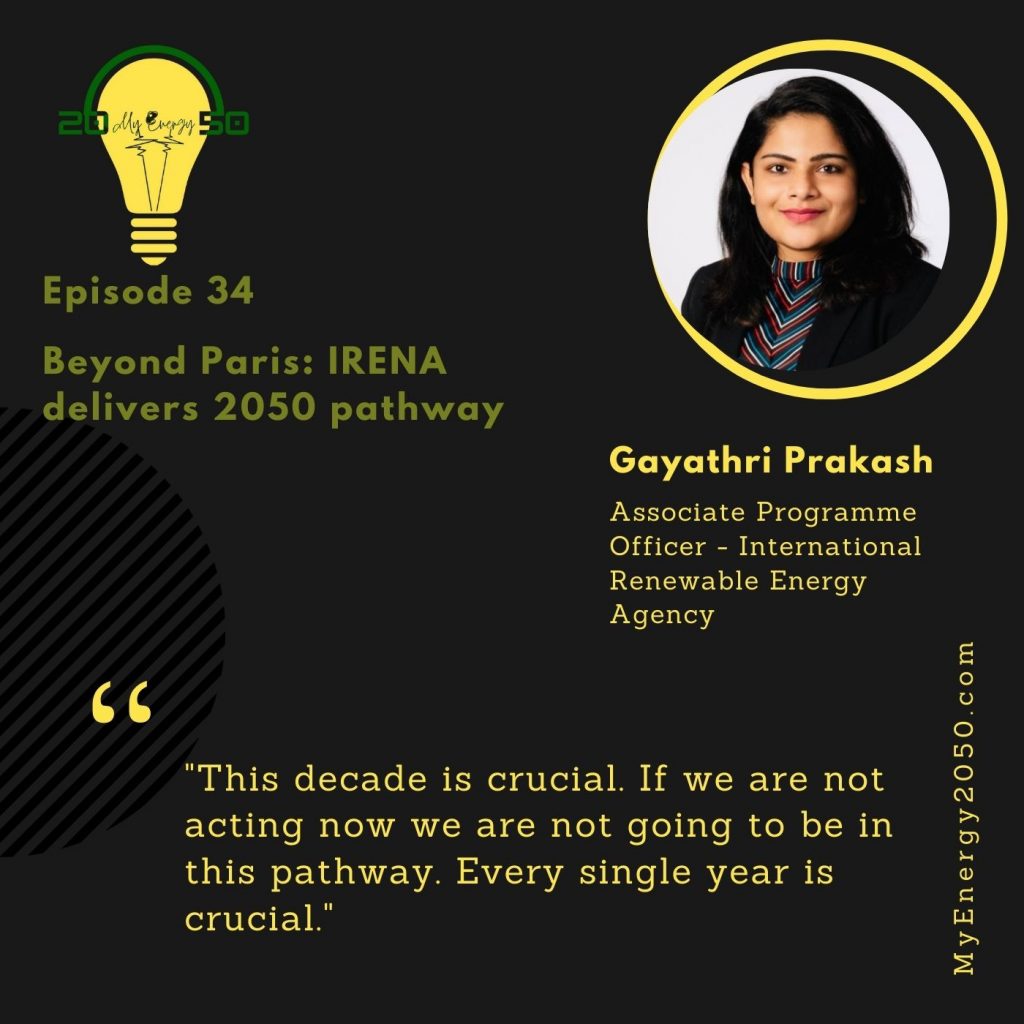This week we speak with Ricardo Gorini and Gayathri Prakas from the ReMap team at the International Renewable Energy Agency (IRENA). IRENA published this summer the World Energy Transitions Outlook: 1.5 degree Celsius Pathway. Our conversation today is about the report. Yes, we get technical, but we also learn about the REASON for the report. This is not your usual climate and death report – rather it’s an ambitious challenge to world leaders to actually deliver the goods by 2050. As the report makes clear, business as usual – even in a Paris scenario – doesn’t deliver the goods. The perspective we gain by having a conversation with members of the team, that put the report together, makes us – or at least me, appreciate the importance of the findings even more.
We learn from Gayathri that the reason for the report is not just to demonstrate that renewables are the cheapest and smartest way to save the planet. We know – or at least many of you listening to this podcast do. What we find out is that the recent youth pressure for countries to do more, to fulfill the Paris Climate Agreement was the reason to push for a 1.5 Celsius scenario. Because as the report states,
“Current plans fall woefully short of a 1.5°C goal. Based on existing government energy plans and targets, including the first round of Nationally Determined Contributions (NDCs) under the Paris Agreement, the policies in place will do no more than stabilise global emissions, with a slight drop as 2050 approaches. Despite clear evidence of human-caused climate change, widespread support for the Paris Agreement, and the prevalence of clean, economical, and sustainable energy options, energy-related CO2 emissions increased by 1.3% annually, on average, between 2014 and 2019.” pg 20
The basis of the report starts with the knowledge that governments are not doing enough and we need to be more ambitious to make it happen.

The report I really like because it maps out the measurable progress we need to make each year to realize a profound shift in technologies and practices. Personally, and professionally speaking, the report delivers a clear path forward. As Gayathri states, every day counts, and she is NOT exaggerating.
As I state in each episode of the My Energy 2050 Podcast, the purpose of this podcast is to highlight the people spreading the knowledge about the energy transition. This episode delivers a homerun on this account. We get a bit technical at times, so on the surface some of our discussion is, well, technical, but as you will hear throughout the episode, the justification and understanding of what technological and policy solutions are on the short term horizon – such as green hydrogen, can deliver a rapid and affordable energy transition.
A big thanks go to IRENA for approving this interview. And it follows episode 11, where I speak with Luis Janiero and Sean Collins about their roadmap for Central and Southeast Europe.
In short, this episode delivers an in-depth discussion on the pace of change, but also the path of technological developments and the tremendous potential we still have to unlock. Because renewables are ALREADY cheaper than fossil fuels. So let’s start working on the transition and leave fossil fuels for the fossils.

” Innovations in technology, policy and markets are being implemented worldwide (IRENA, 2019a). Significant progress has been made in electric mobility, battery storage, digital technologies and artificial intelligence, among others. These shifts are also drawing greater attention to the need for sustainable exploitation and management of rare earths and other minerals, and investment in the circular economy. New and smart grids, ranging from mini to super grids, bolstered by facilitative policies and markets, are enhancing the power sector’s ability to cope with the variability of renewables. Direct uses of renewables – including bioenergy – and green hydrogen are bringing much-needed solutions in transport, buildings and industry.” World Energy Transitions Outlook: 15 degree Celsius Pathway, IRENA, pg 18
World Energy Transitions Outlook: 1.5°C Pathway (irena.org)
Links
World Energy Transitions Outlook: 1.5°C Pathway (irena.org)
Time to Build Green in Central and Southwest Europe – IRENA’s Renewable Roadmaps Team – MyEnergy2050
Dr. Michael LaBelle is an associate professor at Central European University in the Department of Environmental Sciences. He produces the My Energy 2050 podcast to change how we communicate and improve the energy transition.
